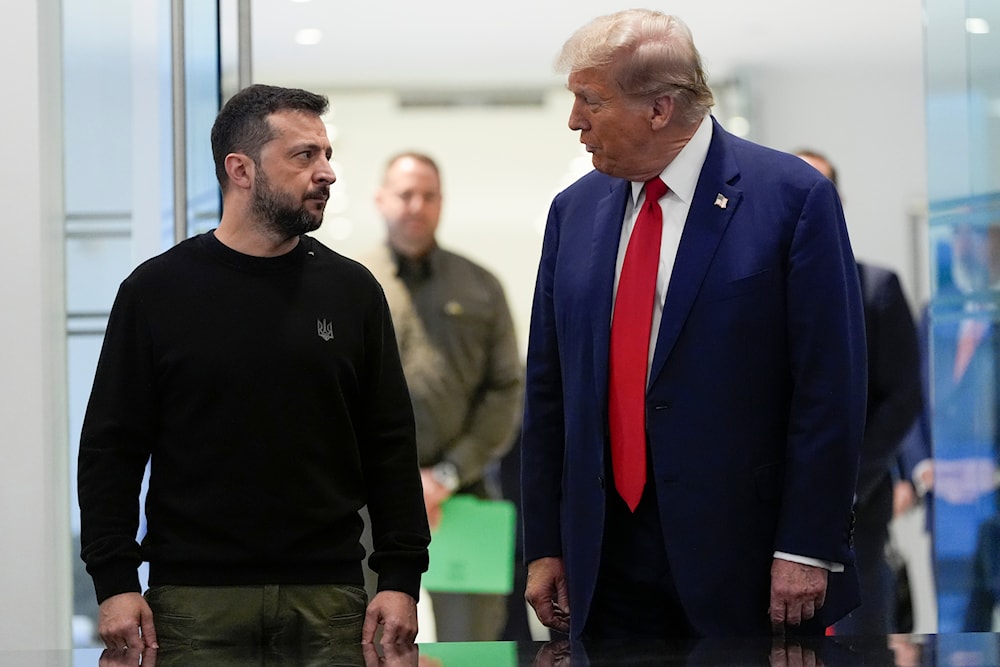US wants Ukraine to hold elections following a ceasefire, says Trump
US Donald Trump has emphasized that the US wants Ukraine to hold elections after a ceasefire, aiming to restore "political stability and legitimacy" while ensuring security guarantees and a deal with Russia are in place.
-

Trump meets with Ukraine's President Volodymyr Zelensky at Trump Tower, on September 27, 2024, in New York. (AP)
The United States is urging Ukraine to hold elections, possibly by the end of the year, particularly if Kiev reaches a ceasefire agreement with Russia in the coming months, according to President Donald Trump's top Ukraine official in a statement to Reuters.
In an interview, Keith Kellogg, Trump's special envoy for Ukraine and Russia, emphasized that Ukrainian presidential and parliamentary elections, suspended due to the war with Russia, "must take place."
"Most democratic nations have elections in their time of war. I think it is important they do so," Kellogg said. "I think it is good for democracy. That's the beauty of a solid democracy, you have more than one person potentially running."
Both Trump and Kellogg have stated that they are working on a plan to negotiate a deal within the first few months of the new administration to end the war that began in February 2022.
They have provided limited details about their strategy to end the war and it remains unclear when they will reveal such a plan.
The Trump plan is still being developed, and no policy decisions have been finalized. However, Kellogg and other White House officials have recently discussed urging Ukraine to agree to elections as part of an initial truce with Russia, according to two individuals familiar with the discussions and a former US official briefed on the election proposal.
According to the two sources familiar with the Trump administration's discussions, Trump officials are considering pushing for an initial ceasefire before attempting to broker a more lasting agreement. They noted that if presidential elections were held in Ukraine, the winner could be tasked with negotiating a long-term deal with Moscow.
The sources declined to be named to discuss sensitive policy and security issues.
It remains unclear how such a Trump proposal would be received in Kiev. President Volodymyr Zelensky has stated that Ukraine could hold elections this year, provided the fighting ends and strong security guarantees are established to prevent Russia from resuming hostilities.
A senior adviser to Kiev and a Ukrainian government source said the Trump administration has not yet formally requested Ukraine hold presidential elections by the end of the year.
'Fears of Russian influence pause elections'
State Department and White House officials emphasized to their Ukrainian counterparts that holding elections was crucial for maintaining international and democratic principles.
However, Kiev has resisted holding elections, expressing concerns that they could divide Ukrainian leadership and potentially open the door to "Russian influence campaigns", according to former US officials.
On that note, Kremlin spokesperson Dmitry Peskov, when asked about these discussions, stated, "We do not have that information."
On January 27, Russian Deputy Foreign Minister Sergei Ryabkov stated that direct contacts between Moscow and the Trump administration had not started, and the Russian Foreign Ministry is still awaiting US approval of its new ambassador to Washington.
Russian President Putin has publicly questioned Zelensky's legitimacy, asserting that without a renewed electoral mandate, Zelensky lacks the legal authority to sign binding peace agreements. While Putin has suggested that Zelensky could still participate in negotiations, he insists that the Ukrainian president must first revoke a 2022 decree banning talks with Russia while Putin remains in power.
Peace deal?
Some former US officials express skepticism about the possibility of reaching a peace deal in the coming months or holding elections in 2025, especially given the apparent disagreement between both sides.
Additionally, reports indicate that Zelensky is requesting US and European security guarantees as part of any potential deal, including the deployment of a foreign military force on the frontlines to ensure Russia complies with any ceasefire agreement.

 4 Min Read
4 Min Read









